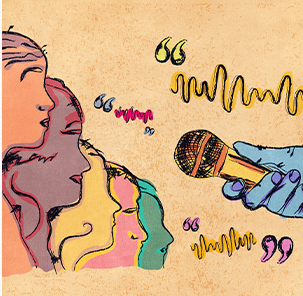Subscribe and receive the best Inkyfada podcasts straight to your mailbox.
Don't miss out! Subscribe to our newsletter to receive the latest Inkyfada podcasts.
Thanks for your inscription
Unsubscribe at any time

Humour and irony occupy an important place in the cultures of various peoples. They have been translated and transposed into many artistic expressions - individual or collective - for the purpose of political, social or intellectual criticism.
Although the humorous and satirical song does not have a long-standing history in Tunisia, it has had some impactful moments. The collective memory has preserved the traces of this impact - whether deliberately or spontaneously - and has recorded names and works that encompass the historical and contextual evolution of the comedy song, from colonial times to the post-independence period, and the construction of the national state.
This popular form of lyrical theatre from the heart of the capital has endured since the 1930s, from Aissaouiet el Balout to more advanced experiments in terms of form and content, such as Al-Samlali, al-Jaziri and al-Jarari, and Saleh al-Khamisi in particular...
As different and varied these experiments may be, they have a common denominator, namely the use of comedy and irony as a form of resistance. This is a defence mechanism that society creates to cope with its woes, express its problems and place itself at the heart of the struggle against the various forms and representations of power.
Inkyfada Podcast is the first platform entirely dedicated to original Tunisian podcasts, and was conceived by Inkyfada media in collaboration with the in-house research and development laboratory, InkyLab. Inkyfada joined the global podcast boom in 2017, when the team produced the first Tunisian audio documentary, diving deep into the belly of the El Kamour struggle taking place in the desert. Since then, Inkyfada Podcast has produced a wide variety of documentaries, investigations, and podcast series, as well as articles accompanied by music; covering a multitude of contemporary issues in order to offer an immersive and alternative podcast experience. Whilst exclusively offering audio content, the Inkyfada Podcast team upholds the same core values and principles of inkyfada.com, and is committed to producing high quality content though a dynamic and meticulous production process. In addition to the permanent team, Inkyfada podcast works closely with various journalists, artists, illustrators, musicians and other content creators in order to diversify the platform and support artistic creativity. These podcasts differ from traditional radiophonic content in that the applied production and editing process is more akin to cinematographic techniques, in addition to being web-based, downloadable and accessible on demand. Additionally, Inkyfada Podcast uniquely offers subtitles in French, Arabic and English for all audio content, the majority of which is recorded in Tunisian or in the preferred language of the speaker in question.